INT’L DAY OF INNOCENT CHILDREN VICTIMS OF AGGRESSION: Salesian programs support youth dealing with trauma
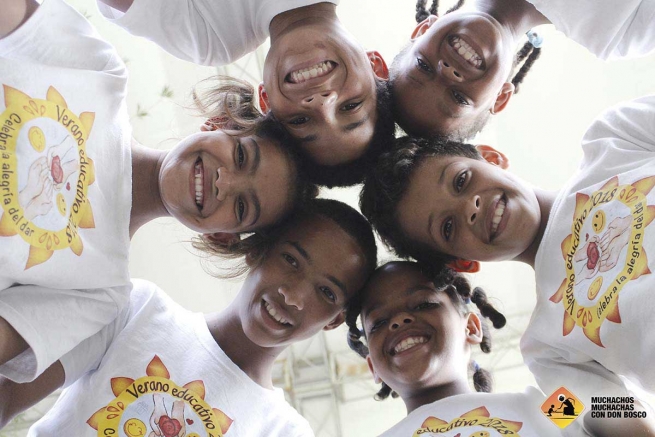
Salesian missionaries in more than 130 countries work to ensure that youth receive support in the aftermath of trauma and abuse
(MissionNewswire) Salesian Missions, the U.S. development arm of the Salesians of Don Bosco, joins humanitarian organizations and the international community in honoring International Day of Innocent Children Victims of Aggression. Recognized on June 4 each year since its United Nations designation in 1982, the day acknowledges the pain suffered by children throughout the world who are the victims of physical, mental and emotional abuse.
The day also affirms the commitment by the U.N. and the international community to protect the rights of children. This work is guided by the Convention on the Rights of the Child, the most rapidly and widely ratified international human rights treaty in history.
International Day of Innocent Children Victims of Aggression honors the millions of individuals and organizations working to protect and preserve the rights of children. Through education and social development programming, Salesian missionaries in more than 130 countries around the globe work to ensure that all youth know their rights, are able to fully participate in their communities, and receive the support they need in the aftermath of trauma and abuse.
Whether it’s providing social support, combating child labor, or assisting the homeless, Salesian missionaries are on the front lines educating youth on their rights and ensuring access to programs and services they need. Working in more than 5,500 Salesian educational institutions and youth centers around the world, missionaries educate children in some of the poorest places on the planet.
“Education is always our primary focus, but we know youth are dealing with much more than just needing access to education,” said Father Gus Baek, director of Salesian Missions. “Salesian missionaries give support to child abuse victims, help rehabilitate child soldiers and street children, and provide education on child rights to ensure that youth have a sense of personal dignity and self-worth.”
In honor of International Day of Innocent Children Victims of Aggression, Salesian Missions highlights unique educational programs that are helping poor youth receive an education, understand their rights and find a path out of poverty, bringing them hope for the future.
COLOMBIA
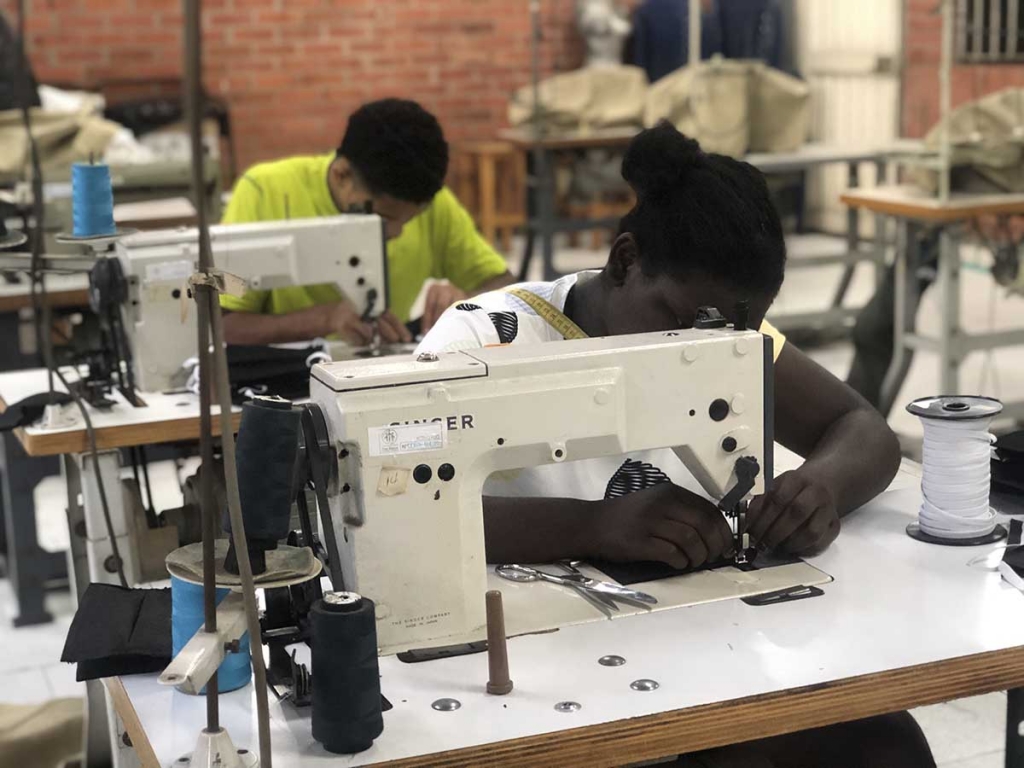
The Don Bosco Center in Colombia provides a chance at rehabilitation for youth who were ripped from their families and forced to become child soldiers.
Salesian missionaries are giving hope for a better life to former child soldiers at the Don Bosco Vocational Training Center (Don Bosco Center) in Cali, Colombia*. The country’s guerrilla warfare has caused more than 300,000 deaths and fueled the growth of powerful drug cartels. The Don Bosco Center provides a chance at rehabilitation for youth who have been ripped from their families at a young age and forced to shoot, throw bombs, or become servants of officers and sexually abused.
Upon arrival at the Don Bosco Center, youth are given a uniform and tools that correspond to the profession they have chosen to learn. More importantly, they are given a chance to reclaim their personal identity and begin to rebuild their self-esteem and trust in others.
Don Bosco Center has a team of professionals who help youth establish a training plan. Youth can take coursework to become electricians, industrial mechanics, automobile repair technicians, cooks, tailors, beauticians, welders, computer operators, accountants, librarians or commercial secretaries. Workshops serve as the cornerstone of development. Youth learn safety regulations, handle machines and products, and take life skills training to help personally and professionally.
Currently, five Salesians support 30 youth in the program. For security reasons, youth live at the center. Their names have not been deleted from the lists held by the guerrilla leaders, who aim to send them back into service or seek revenge for leaving. In the center, youth learn to re-adapt to normal living — sharing a meal with friends, having free time and understanding the rules of peaceful coexistence. During the COVID-19 pandemic, these youth stepped up and put their new-found skills to use creating masks for those in the city.
DOMINICAN REPUBLIC
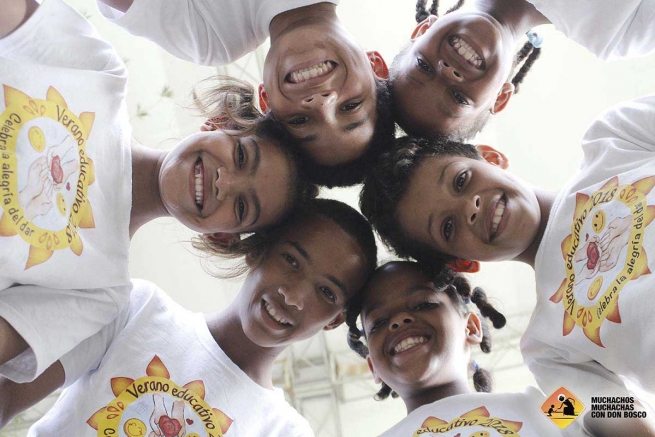
Over its history, the Boys and Girls Don Bosco Network in the Dominican Republic has supported more than 60,000 youth.
The Boys and Girls Don Bosco Network, located in Santo Domingo, Dominican Republic, manages the “Protect Childhood” campaign. The organization has spent the last 35 years working to protect vulnerable children. Statistics in the country show that 62 percent of children between ages 1-14 suffer some form of abuse and maltreatment. Over its history, the Boys and Girls Don Bosco Network has supported more than 60,000 youth, impacting more than 25,000 families directly and benefiting more than 150,000 people indirectly.
The Boys and Girls Don Bosco Network ensures the promotion of children’s rights, and it aims to raise awareness, educate, and inform the population how to prevent abuse and mistreatment. As part of the campaign, workshops, forums, and other activities were held to spread the message that everyone is responsible and must play a part in keeping children safe.
Representatives from UNICEF participated in first forum entitled “The current reality of childhood in the Antillean country: challenges and tasks to guarantee the rights of children and adolescents.” Another forum was held with the support of the National Council for Adolescence and Childhood of the Dominican Republic on the theme “Public policies in favor of children: tasks and challenges for their implementation. A third forum entitled “Good practices” was a collaborative effort of various institutions that are part of the Coalition for Children.
MALI
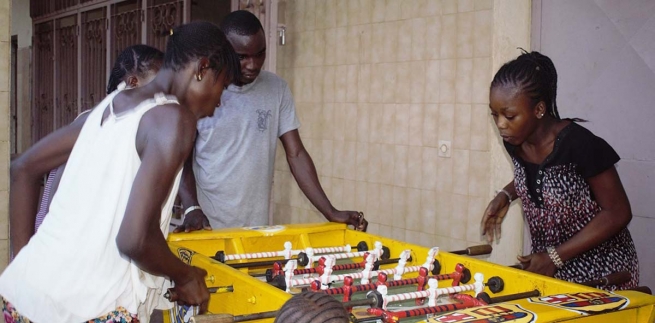
The Salesian Père Michael Training Center in Mali helps keep young people, ages 12-25, away from the street.
The Salesian Père Michael Training Center in Bamako, the capital and largest city of Mali*, is bringing joy, providing education, and cultivating peace among children and older youth. The center keeps its doors open all day and provides support to hundreds of youth from the Niarela district and the outskirts of the city. It also works as a deterrent for children being recruited as child soldiers.
Youth come to the center to play sports, learn music or study at its library. The center provides a safe haven where youth have an opportunity to live, dream of a future, study, and learn the importance of being committed and collaborating in groups. They are able to express themselves freely and access the support of adults.
The goal is to keep young people, ages 12-25, away from the street and harmful habits such as alcohol or drugs. Instead, youth are offered an educational space during their free time which promotes cultural activities and allows the development of values. Salesian missionaries have been able to access sports equipment for the girls’ basketball team, set up a music training center, and organize health and hygiene awareness days to prevent diseases and promote a healthy lifestyle.
UKRAINE
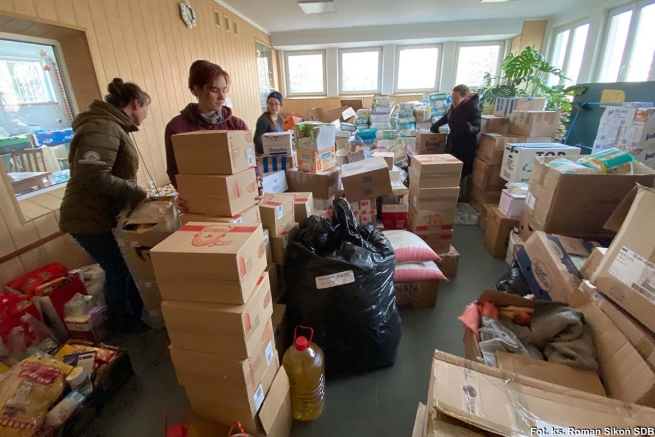
Ukrainian refugees are receiving shelter and basic necessities from Salesians, and in oratories, there is access to free legal and psychological support.
Salesian missionaries living and working in Ukraine* have remained to help provide for citizens who have stayed in the country during the conflict. Some Ukrainians stayed only long enough until they could find a safe place to go. Others are elderly and are unable to travel. To date, more than 5.5 million people have fled the country in search of safety. Those who remain are in need of humanitarian aid, and Salesians are on the front lines helping these families.
Natalka, along with her two children ages 2 and 5, sheltered in a cellar without lighting and heating for days. With all the shops closed, she was only able to buy bread when it was distributed in the street. Natalka said, “All I could think about was what I was leaving behind — my husband, but most of all what I was gaining — saving their lives.”
Now that she is safe with Salesians in Poland, she is helping her children to overcome the fear they are still feeling every time planes fly overhead. Natalka worries for her husband still in Ukraine, but he is consoled by knowing that she is receiving support and shelter.
Natalka’s family is not the only family to be welcomed by the Polish Salesians. Across four Polish Salesian Provinces, there are 1,117 places for refugees in Salesian centers. Right now, 500 refugees have received shelter. Salesian missionaries are providing what they can to meet basic needs but they will need more support to be able to continue. Salesian oratories are also providing support for Ukrainian children and their mothers. There is access to free legal and psychological support.
###
Sources:
ANS Photos (usage permissions and guidelines must be requested from ANS)
COLOMBIA: 30 former child soldiers rebuild trust in others
DOMINICAN REPUBLIC: Campaign to prevent child abuse launches
MALI: Center provides safe haven for youth
UKRAINE: Salesians in Poland provide shelter and aid for refugees
UN International Day of Innocent Children Victims of Aggression
*Any goods, services, or funds provided by Salesian Missions to programs located in this country were administered in compliance with applicable laws and regulations, including sanctions administered by the U.S. Department of Treasury’s Office of Foreign Asset Control.




